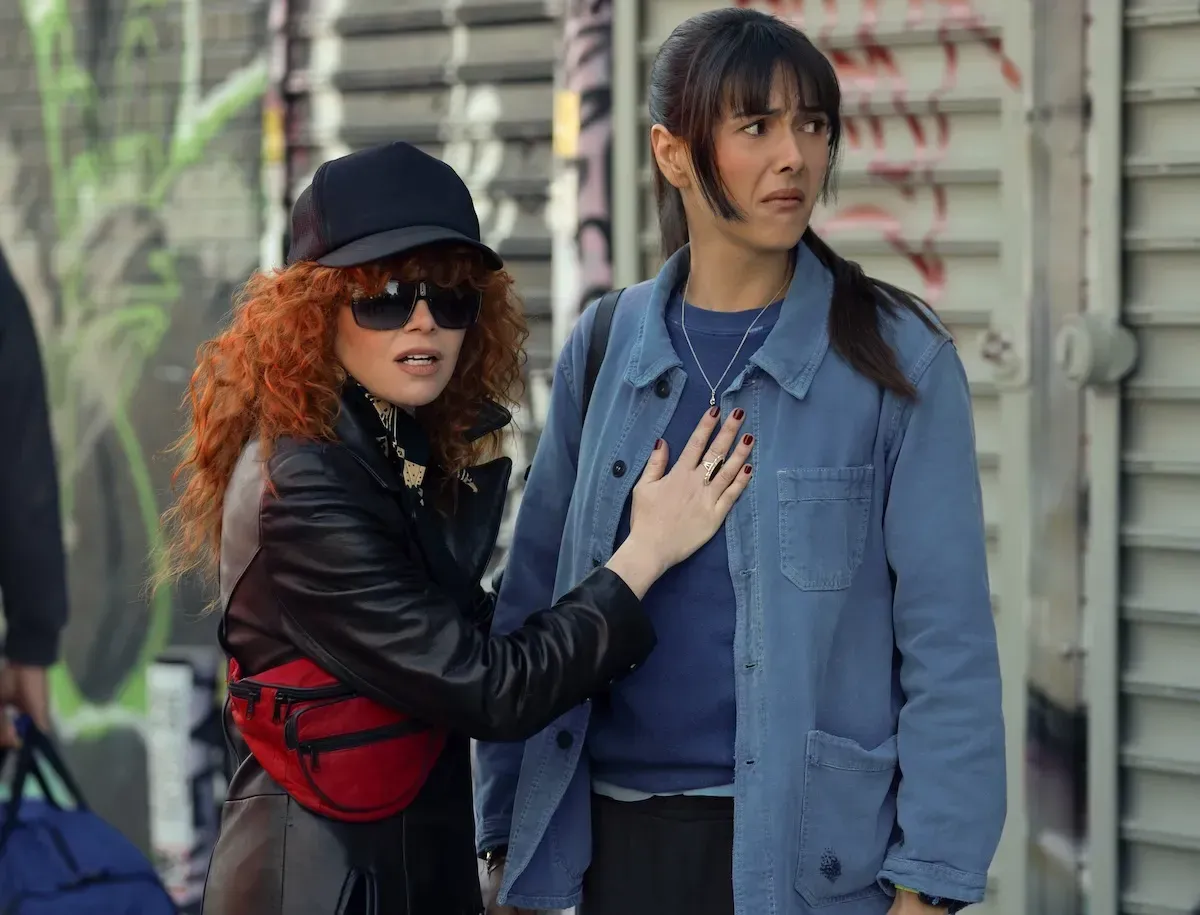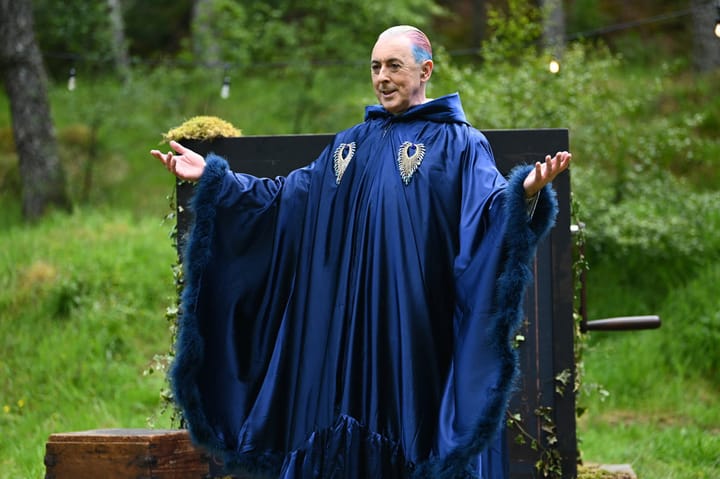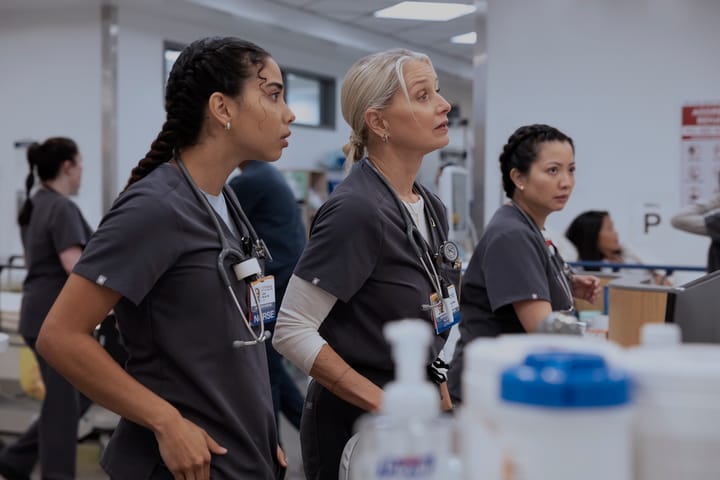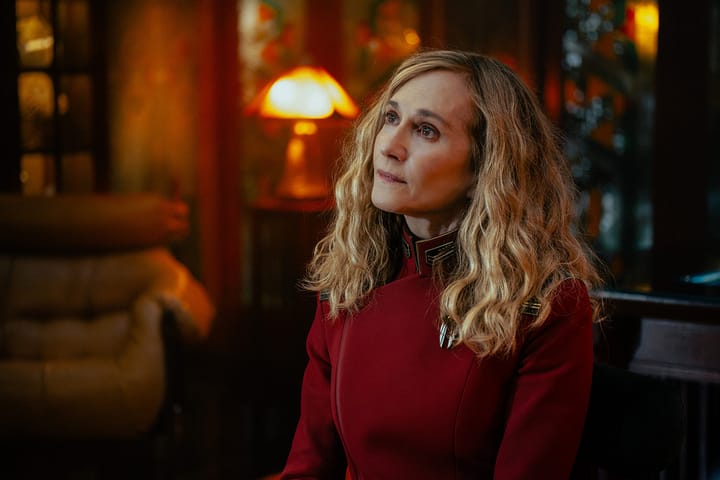Review: Poker Face, "The End of the Road" | Season 2, Episode 12
Do you understand the tables are my corn?

“You gave me a reason to live.”
Just as it is true that the formula of a crime procedural can become predictable, so too can a reviewer of the procedural become somewhat familiar. A couple weeks ago, when “The Big Pump” aired, I was pleased and surprised to get name-checked in a review of the same episode over at The A.V. Club by Noel Murray. Noel noted how I like to recommend episodes of Columbo when I review episodes of Poker Face, largely because this show has been nakedly obvious about the creative debt it owes to Peter Falk’s exploits back in the 1970s.
But just as the last couple episodes of Poker Face have attempted to upend its formula, I figure I might as well do the same this week.1 Not only am I taking the recommendation out of the Stray Observations, I’m not even going to recommend an episode of Columbo this week. Technically, it’s not even a recommendation as much as an allusion, but an apt one, nonetheless. See, about a third of the way through “The End of the Road,” I was thinking of the season-one finale of the BBC show Sherlock. If you haven’t seen the show, a) you should (at least the first season), and b) let me briefly explain why I was thinking of “The Great Game.”
Although the Steven Moffat-created update of the Sherlock Holmes stories is proudly modern, it does hit a lot of familiar beats. Sherlock (then played by Benedict Cumberbatch, in the role that helped vault him into stardom) is mercurial: he’s half-crazy, he’s incredibly intelligent, and of course, he has his good friend Watson. As played by Martin Freeman, this John Watson is far from the avuncular comic-relief figure of the old-school Sherlock Holmes movies with Basil Rathbone, but still not as sharp as Sherlock even as he deals with PTSD from his time in the Iraq War. In “The Great Game,” we finally meet the yang to Sherlock’s yin: James Moriarty.
If you do recall “The Great Game,” you recall that the tense final scene—set at night at a deserted gym—allows Sherlock to meet Moriarty for the first time. And for a brief moment, Sherlock thinks the mysterious Moriarty is none other than…John Watson. Now, within the confines of Sherlock, Watson is exactly who we expect Watson to be; he’s not actually Moriarty, but has been rigged up to explosives and is being told to speak to Sherlock as if he is Moriarty. But Moriarty is someone else entirely (and played by Andrew Scott, quite well). Moffat faking out the audience is maybe a cheap trick, but listen…you would be a bit surprised if Sherlock’s best friend was actually his worst enemy, right?
And now that you have presumably watched “The End of the Road,” you know exactly why I’m invoking this scene, because that very question is at the heart of the big reveal. What if Charlie Cale’s new best friend Alex was actually the Moriarty to her Sherlock? We even get something of a similar fakeout, as Alex initially presents herself as being held at gunpoint before copping to the truth. Alex is no innocent; she’s the Iguana, a masterful assassin who had grown so bored of her job that the only thing keeping her going was the thought of coming up against a human lie detector.
Now, a good chunk of “The End of the Road” is spent doubling back and forth to make sure we understand how and why Alex was able to pull so many lies over on Charlie over the last four episodes. We do get Charlie attempting to explain away her inability to recognize a voluminous set of lies by saying she wasn’t actively trying to catch Alex. But the point is, a person who built up a reputation for spotting bullshit on the regular was being fooled constantly, even if the act of lying with such skill was apparently a “Herculean task.”
If I have a nitpick about the entire reveal, it’s that Patti Harrison is an awfully young actress to play someone who had been so widely known for their vicious exploits for so many years. But that’s a smaller quibble. I found myself left, generally, a bit nonplussed by this surprise. It’s not that the episode doesn’t play fair, nor that I predicted the twist in advance. And it’s not that this show doesn’t enjoy subverting our expectations, even the mild ones. (Like, for example, my assumption that Rhea Perlman would actually have dialogue, instead of showing up as a corpse.) As has been painfully obvious to you all, I love shows like Columbo, and wish more shows now attempted to ape its style or felt willing to riff on classic TV mysteries.2 Poker Face has pushed the boundaries of the formula almost from the beginning, but this season in particular, it has felt like Natasha Lyonne and the writers have chafed a bit at the prison of their own making.
In some ways, the concluding moments of “The End of the Road” present the possibility of a third season of Poker Face that resets to what the show was at the start. There is a woman on the run, in spite of her innocence, who is capable of detecting even the tiniest white lie, and will likely float from place to place because she can’t settle down. Streaming platforms being what they are, the fact that (as I write these words) there has been no news about a third season of Poker Face could mean nothing. The episode’s title aside, this doesn’t have to be the end for Charlie Cale. Yet if it’s soon revealed that Natasha Lyonne’s ready to move on, it would not shock me.
Now, I would be disappointed if we never return to the world of Charlie Cale, because there is at least one baffling loose end this show seems stridently unwilling to tie up. If you buy into the creative concept of Chekhov’s Gun, then this season of television left a very obvious gun unfired, in the form of Steve Buscemi as Good Buddy. I kept waiting for Buscemi to show up, either in the most obvious guise (as the truck driver heading to Wichita in the final scene), or as the true puppet master. I’m not saying the latter option would make a ton of sense, but I maintain that it is enormously weird that a guy who Charlie never saw gave her the keys to his apartment, conveniently located close enough to a coffee shop that served as the initial meeting point for Charlie and her eventual nemesis. If Charlie Cale has learned a lesson this season, it’s that she should keep her guard up a lot more and be less willing to trust strangers. As much as she seemed initially wary of Alex, she never seemed remotely as concerned about Good Buddy, and it’s always been a little odd that we don’t know anything about this dude’s whole deal.
Poker Face indulging in odd touches is not a new thing, and it’s to the show’s credit that you can never quite tell when a newly unexpected twist might occur. I know that a few folks, per a comment recently, had begun to wonder if Alex was up to something thanks to some inconsistency about her purported cinnamon allergy. (That’s what gives her away to Charlie, thanks to a well-placed glimpse of some Big Red chewing gum.) But I’m sure none of us expected a Thelma and Louise-style fakeout ending with a “To Be Continued” card…seven minutes before the end credits. The actual resolution does leave some balls hanging in the air, such as the inexplicable lack of a charred body in the destroyed Barracuda and—most importantly—Charlie being on the run with a yippy little dog, her gumption, and not much else. Those touches feel vastly less quirky than what occurs right before it, not just with the faux-cliffhanger ending but also with the freeze-frame shots of Charlie and Alex (and the car) scored to “King of the Road.”
I enjoyed many aspects of the second season of Poker Face, from the solid guest-star casting to Lyonne herself to the delightfully loopy Harrison. But where our mutual friend Noel (per his most recent review of the show at The AV Club) likes how Poker Face chafes against its own formula and instead tries for more season-long arcs and twists than a show like Columbo, I gotta be honest: I think the weekly-mystery aspect is more compelling even as I acknowledge that the writers’ hearts weren’t in fleshing those details out each installment. At least one quarter of this season’s episodes run against the established formula, but if you asked for my high points, it would be episodes like “The Game is A Foot” or “Hometown Hero,” each of which is very much a traditional installment.
If I leave this season a bit miffed, it’s also partially because of the aforementioned lack of a third-season announcement. It may be apt to leave Charlie Cale as we met her: desperate, on the run, and mostly very shrewd. (I say “mostly” because even before Alex is revealed as the Iguana, Charlie makes some odd choices that seem to exist solely to enable Alex from a writer’s perspective. Why would Charlie have Alex go inside the diner, seeing as Alex is the one accused of murder, for example? Why have either of them go in alone? Save that smoke break for later, Charlie.) But it’s to the show’s credit that I want more, even if a third season may lean a bit more on keeping abreast of how the FBI and other agencies are trying to hunt Charlie down. While I do think this season was a bit of a letdown, it’s still a solid hang and one I’ll be sad to leave.
Stray Observations
- While we sadly don’t get Steve Buscemi in the flesh, the truck driver in the final moments is another Steve! Musician Steve Earle, that is.
- Just as there was a mysterious voice at the end of the first-season finale, we do get one uncredited voice in this finale, too. I checked the end credits, and no one is listed as the voice of Alex’s agent, Cedric. But…I mean, c’mon. It’s Harvey Fierstein, right?
- Adam Arkin spent a couple of episodes behind the camera as director, so it’s only fitting that he briefly shows up in a cameo as the CEO living underneath the Alaskan wilderness who can’t outrun the Iguana.
- If nothing else, I appreciate this show giving me reason after barely logical reason to invoke Patti Harrison’s sketches from I Think You Should Leave.
- While I think it’s, let’s say, extremely convenient how quickly Luca arrives in Indiana after locating Charlie and Alex, I did laugh when he said, “The hostage has a plan!”
- Funny little exchange between Charlie and Luca at the end: “Not bad for two people under 5’ 5”!” “5’7”.” “…I’ll allow it.”
- I also very much enjoyed Luca’s big speech earlier in the episode to his superiors about Charlie’s innate gifts, not solely for the visual punchline at the end. Maybe it’s just me, but that speech felt awfully reminiscent of a bit from Mission: Impossible – Rogue Nation, in which a government leader played by Alec Baldwin refers to Ethan Hunt as “the living manifestation of destiny.” And we know this show wants to know what Ethan Hunt would do.
- And that, friends, wraps us up for the second season of Poker Face! I’ve enjoyed taking this journey with you all, even if it’s a bit bumpier than last go-round.




Comments ()